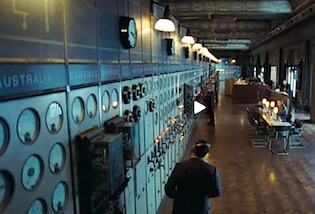 The King’s Speech is worthy of the Best Actor award Colin Firth will likely garner at this year’s Academy Awards as a proxy for Best Picture going elsewhere. The Oscar voters are younger these days and will overlook the story of Queen Elizabeth’s stuttering father and how the reluctant prince reached the throne. They’ll vote for King Mark of Facebook instead.
The King’s Speech is worthy of the Best Actor award Colin Firth will likely garner at this year’s Academy Awards as a proxy for Best Picture going elsewhere. The Oscar voters are younger these days and will overlook the story of Queen Elizabeth’s stuttering father and how the reluctant prince reached the throne. They’ll vote for King Mark of Facebook instead.
But this isn’t about the Oscars; it’s about the remarkable scene late in the film when King George makes his way down rows of huge metal machines to a small shrouded room where he is to deliver a speech to the British Empire on its entry into war with Hitler and Germany. For those on Facebook, Twitter, or Quora, Hitler was a really bad man who looked a lot like Robert Downey in his Charlie Chaplin biopic. Charlie Chaplin was a …. Oh never mind.
Anyway, the King marched past these machines marked Canada, Australia, and the other colonies. For the Facebook, Twitter, Quora crowd, we here in the United States used to be subjects of the King or Queen and therefore required to bow and curtsy as he or she passed by. Another synonym for curtsy is to scrape, as in grovel but not as in scrape Google search results. Anyway, these machines were all connected by huge cables to the main control console where the King’s microphone was turned into radio waves. In turn, each machine sent the signal to each country. sort of like Seesmic or Tweetdeck, where each stream has its own column.
The speech came at a point in England’s history where the monarchy was fading in relevance but not in its importance. As the King said in the film, he had none of the power to form a government or start a war but was expected to lead his subjects through the darkest of times. For Facebook, Twitter, and Quora subjects, it was like being Google with all the money in the world but no clue about how to get social.
Being a true story, the King’s speech was obviously destined to be a triumph over adversity. This being Hollywood or something akin to it, we weren’t about to see the King fail and quit in ignominy like Nixon or go on hiatus like Charlie Sheen. As the speech wound its way through strangled stutters and hilarious obscenity-laced silences, the filmmakers cut from scene to scene of ordinary people listening around the radio in living rooms and leaning on the bar in pubs. Like a series of paintings, the emotion of the common bond of king and subject resonated in the faces of the assembled. A nation clicking the Like button.
Today our royalty takes the form of Brangelina and Buzz Lightyear. Instead of giant machines paging down a long hallway, we carry our radios in our pockets and foment revolutions in an instant on Twitter. We are no longer subjects but followers, and our royalty are no longer born to the crown but IPOed. Pretenders to the throne are no longer upstarts but startups. Public flogging no longer takes place in the town square but on TechCrunch and Gawker.
Have you seen my favorite commercial, the one where Honest Abe Lincoln squirms as he attempts to wriggle out of his wife asking whether her new dress makes her backside look big? That’s the magic of The King’s Speech, an elaborate fiction designed to show us how common the royals are and how royal the rest of us are. For those of us on Facebook, Twitter, and Quora, it’s time to party like it’s 1939.